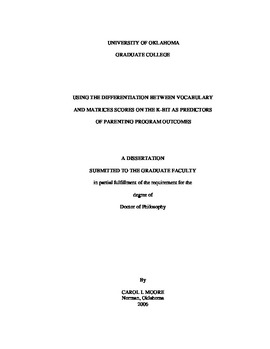| dc.contributor.advisor | Beesley, Denise, | en_US |
| dc.contributor.author | Moore, Carol I. | en_US |
| dc.date.accessioned | 2013-08-16T12:20:01Z | |
| dc.date.available | 2013-08-16T12:20:01Z | |
| dc.date.issued | 2006 | en_US |
| dc.identifier.uri | https://hdl.handle.net/11244/978 | |
| dc.description.abstract | This study examined whether the Kaufman Brief Intelligence Test (K-BIT) Matrices subtest was more predictive than the K-BIT Vocabulary subtest of parenting program completion and whether select demographic variables, K-BIT subtest scores, parenting programs (PCIT or regular parenting class), and reported barriers to participation were predictive of parenting program outcomes (completion or noncompletion). Research participants consisted of 93 parents enrolled in community-based parenting classes. Results from a regression analysis indicated that the K-BIT Matrices subtest was not more predictive than the K-BIT Vocabulary subtest of parenting program completion. In addition, a discriminant analysis revealed that select demographic variables, parenting programs, and reported barriers to participation were not predictive of parenting program outcomes. | en_US |
| dc.format.extent | vii, 90 leaves ; | en_US |
| dc.subject | Psychology, Psychometrics. | en_US |
| dc.subject | Psychology, Clinical. | en_US |
| dc.subject | Parenting Study and teaching. | en_US |
| dc.subject | Kaufman Brief Intelligence Test. | en_US |
| dc.title | Using the differentiation between vocabulary and matrices scores on the K-BIT as predictors of parenting program outcomes. | en_US |
| dc.type | Thesis | en_US |
| dc.thesis.degree | Ph.D. | en_US |
| dc.thesis.degreeDiscipline | Department of Educational Psychology | en_US |
| dc.note | Adviser: Denise Beesley. | en_US |
| dc.note | Source: Dissertation Abstracts International, Volume: 67-01, Section: B, page: 0595. | en_US |
| ou.identifier | (UMI)AAI3206877 | en_US |
| ou.group | Jeannine Rainbolt College of Education::Department of Educational Psychology | |
